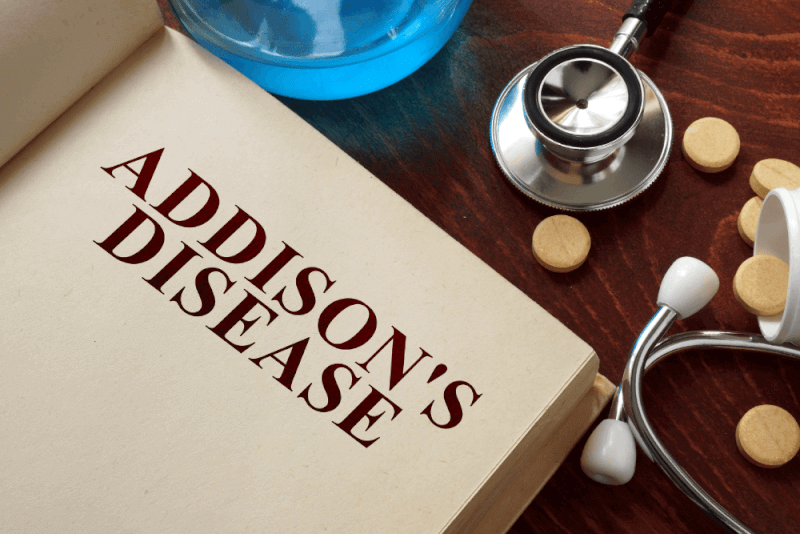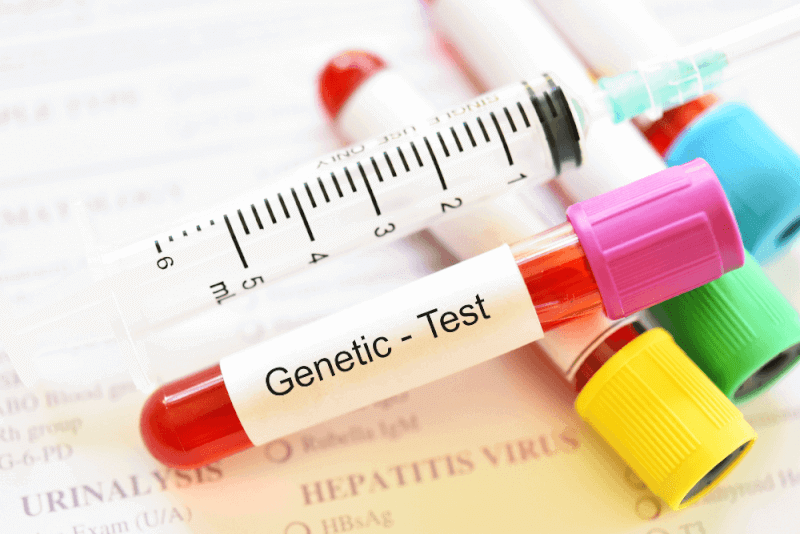30-Second Summary
- Addison's disease is a condition that occurs when the adrenal glands do not produce enough hormones.
- The adrenal glands produce hormones like cortisol and aldosterone, which help the body manage stress, regulate blood pressure, and maintain electrolyte balance.
- Symptoms include fatigue, weakness, weight loss, nausea, vomiting, diarrhea, low blood pressure, skin darkening, and, in emergencies, coma.
- Treatment involves replacing the missing hormones. Patients must undergo lifelong hormone replacement therapy.
What is Addison's Disease (Adrenal Insufficiency)?
Addison's disease, also known as adrenal insufficiency, is a rare disease that can be described as a condition where certain hormones are not sufficiently produced by the body. Specifically, the adrenal glands produce hormones such as aldosterone and cortisol at levels below normal. Addison's disease affects all age groups and genders and poses a potential life threat.
Types of Addison's Disease (Adrenal Insufficiency)
Addison's disease is divided into two types. This variation is due to the area where the hormone deficiency occurs.
Primary Adrenal Insufficiency
This type of Addison's disease occurs due to damage to the cortex of the adrenal glands. It is usually caused by an autoimmune disease where the immune system attacks healthy body tissues.
For unknown reasons, the immune system attacks the adrenal cortex, leading to insufficient hormone production. Additionally, patients with Addison's disease are at a higher risk of other autoimmune diseases.
Other causes of primary adrenal insufficiency include various infections, cancers that metastasize to the adrenal glands, hemorrhage, and tuberculosis. Particularly, hemorrhages in the adrenal glands can cause sudden Addisonian crises without prior symptoms.
Secondary Adrenal Insufficiency
ACTH, a hormone produced by the pituitary gland, stimulates the adrenal cortex. However, if the pituitary gland is damaged for any reason, the adrenal cortex is not sufficiently stimulated. Conditions like benign pituitary tumors or pituitary surgery, and in some cases, without any cause, may lead to androgen and glucocorticoid deficiencies produced by the adrenal glands.
This condition, where the adrenal cortex is not stimulated due to various reasons, is called secondary adrenal insufficiency. Many symptoms of secondary adrenal insufficiency are similar to those of primary adrenal insufficiency. However, skin darkening does not occur in secondary adrenal insufficiency.
Severe dehydration or low blood pressure is also less likely. Conversely, hypoglycemia is more common in secondary adrenal insufficiency. Secondary adrenal insufficiency can also be temporary.
Sudden discontinuation of corticosteroids used to treat conditions like arthritis or asthma can temporarily cause secondary adrenal insufficiency. Therefore, it is essential to follow the doctor’s instructions to avoid side effects when using these medications.
Symptoms of Addison's Disease (Adrenal Insufficiency)
The symptoms of Addison's disease vary. This is due to the differences in hormones that are deficient in the body. To understand the symptoms of the disease, it is essential to know the functions of these hormones.
For example, cortisol is a hormone released in response to stress, helping the body manage stress. It also aids in regulating the use of protein, fat, and carbohydrates, controls inflammation, and manages cardiovascular function and blood pressure.
Aldosterone, on the other hand, helps remove potassium from the kidneys and reabsorbs sodium, maintaining the body’s electrolyte balance. When aldosterone, a steroid hormone, is insufficient, the kidneys struggle to maintain water and salt balance, leading to dehydration and low blood pressure.
Symptoms of Addison's disease begin to appear over several months, manifesting slowly. Due to the gradual onset of symptoms, some symptoms may be overlooked. The most prominent symptoms of Addison's disease include:
- Hair growth in women in armpit and genital areas
- Reduced sweating
- Depression
- Other behavioral disorders
- Irritability
- Muscle pain
- Fasting hypoglycemia
- Joint pain
- Weight loss
- Severe fatigue
- Abdominal pain
- Nausea
- Fainting
- Diarrhea
- Vomiting
- Low blood sugar
- Increased salt cravings
- Low blood pressure
- Darkening of the skin, mouth mucosa, nipples, genital area, and scars
Causes of Addison's Disease (Adrenal Insufficiency)
The primary cause of Addison's disease is the immune system attacking the adrenal glands, causing tissue damage. Other causes include:
- Genetic defects
- Abnormal accumulation of certain proteins in tissues
- Abnormal accumulation of certain proteins in organs
- Surgical removal of the adrenal glands due to another condition
- Bleeding in the adrenal glands
- AIDS
- Tumors that impair adrenal function
- Tuberculosis
- HIV
- Various fungal infections
- Trauma or injury to the adrenal glands
Addisonian Crisis
In an Addisonian crisis, symptoms appear rapidly and can be life-threatening. Patients with Addison's disease should seek emergency medical attention if they experience the following symptoms:
- Pale and moist skin
- Cold skin
- Severe dehydration
- Feeling of drowsiness
- Loss of consciousness
- Weak and feeble muscles
- Severe vomiting
- Diarrhea
- Dizziness
- Rapid breathing
- Sweating
Additionally, some patients may experience the following symptoms during an Addisonian crisis:
- High potassium levels
- Low sodium levels
- Low blood pressure
Symptoms of an Addisonian Crisis
Crises related to adrenal insufficiency can occur in Addison's disease, posing a life-threatening health risk. Symptoms that may appear during an Addisonian crisis include:
- Confusion
- Severe weakness
- Vomiting
- Low blood pressure
- Abdominal pain
- Dehydration due to fluid and electrolyte loss
Diagnostic Methods (Tests) for Addison's Disease (Adrenal Insufficiency)
During the diagnosis process, doctors first gather information about patients' complaints and medical history. If Addison's disease is suspected, doctors request a series of tests.
Blood Test
Initially, blood tests are requested to diagnose Addison's disease, measuring potassium, sodium, ACTH, and cortisol levels. In addition, antibodies related to Addison's disease are examined to determine the presence of autoimmune disease.
Insulin-Induced Hypoglycemia Test
If secondary adrenal insufficiency is suspected, an insulin-induced hypoglycemia test is performed. Insulin injection is administered, followed by measurements of cortisol and blood sugar levels. In healthy individuals, glucose levels decrease and cortisol levels increase after injection.
Imaging Tests
Imaging methods are used to check for any structural abnormalities in the adrenal glands, particularly through abdominal CT scans. If Addison's disease is detected, the pituitary gland is also scanned using MRI.
Treatment of Addison's Disease
Hormone replacement therapy is used to treat Addison's disease. These medications, taken daily, replace the missing hormones. If needed, aldosterone can be replaced with fludrocortisone acetate or steroids taken once daily.
It is essential that patients take their medications regularly and at the correct doses. Finding the correct dose may take some time, but once established, patients can lead a normal life.
Lifestyle Changes for Addison’s Disease Patients (Adrenal Insufficiency)
Addison's disease is a chronic condition, so patients must adjust their lifestyle accordingly. Important points include:
- Patients should always carry a warning card or bracelet. In emergencies, these alerts help healthcare personnel understand the type of care needed.
- Patients should always carry their medication and keep it in an accessible place. Missing even one dose can lead to severe health problems.
- Patients should also carry a glucocorticoid injection kit for emergencies, containing injectable corticosteroids.
- Maintaining regular communication with healthcare providers is crucial. Patients should update their doctors if any issues arise to ensure their medication doses are correct.
- Annual check-ups are essential to keep the disease under control.
Diet for Addison's Disease
Patients with Addison's disease should avoid stress and establish a healthy diet to reduce sensitivity to the disease.
- To counteract fatigue, patients should avoid caffeinated drinks like coffee, soda, and energy drinks, as caffeine overstimulates the adrenal glands. High sugar content in these drinks also harms the adrenal glands, as do tobacco products.
- Patients should avoid carbohydrates and refined sugars, especially processed foods. Those with Addison's disease and diabetes should be particularly cautious, as these foods destabilize blood sugar levels, exacerbating Addison's symptoms.
- The need for salt in Addison's disease is still debated, but sodium is essential to regulate low blood sugar, especially when derived from high-quality sources like Himalayan or sea salt.
- It is known that patients with Addison's disease crave salt, especially those who sweat a lot. Drinking plenty of water is also vital for these patients.
- Being under extreme stress can trigger Addison's disease, so patients are advised to increase their vitamin C intake during stressful times. Antidepressants may also strengthen the immune system, but patients should consult their doctors before use.
- Another essential vitamin is B, which promotes healthier nerve cells. Foods rich in B vitamins include shellfish, farm eggs, salmon, and sardines.
- To support immune function, patients should ensure adequate zinc intake, as it aids in hormone production that helps combat stress. Zinc-rich foods include seafood, spinach, beans, and mushrooms.
- Finally, adequate magnesium intake is crucial for calming the nervous system. Magnesium-rich foods include spinach, nuts, yogurt, bananas, beans, and avocados.












